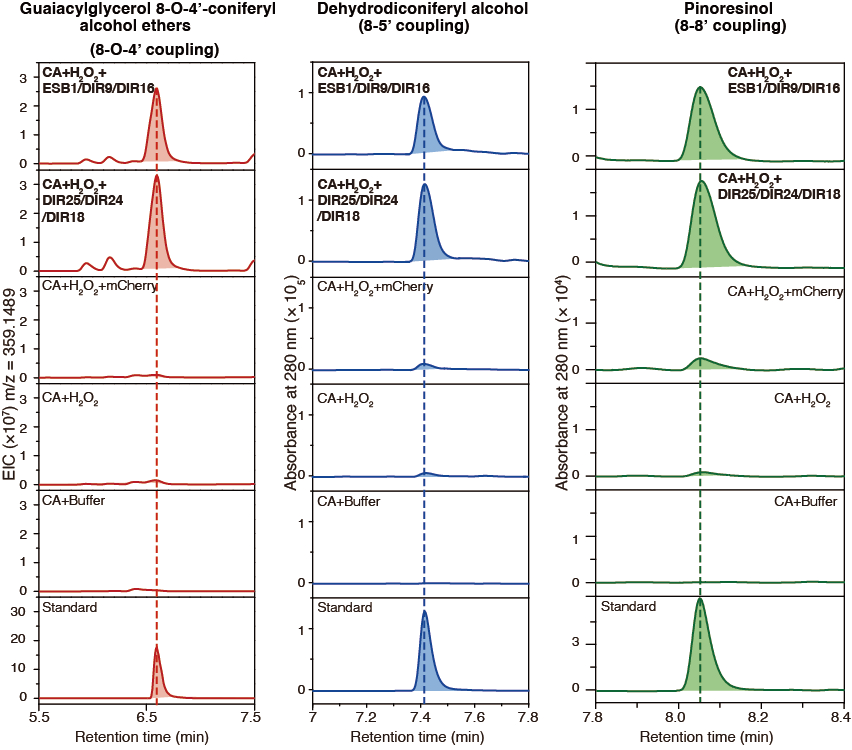A Collaborative Study Discovered a Protein Complex Essential for Nutrient Homeostasis and Lignin Polymerization
On October 27 (Beijing Time), 2023, the internationally renowned academic journal Science published online a research paper titled "A dirigent protein complex directs lignin polymerization and assembly of the root diffusion barrier," which was completed through a collaboration between the research group led by Prof Dai-Yin Chao from CEMPS (the Chinese Academy of Sciences Center for Excellence in Molecular Plant Sciences) and Prof. David Salt's group at the University of Nottingham in the United Kingdom. This research elucidates the crucial role of dirigent proteins (DPs) in the formation of the Casparian strip and lignin polymerization in plants, providing new theoretical insights for future molecular design of crops aimed at efficient water and nutrient utilization.
The Casparian strip is a specialized cell wall structure in the root endodermal cells of plants, primarily composed of waterproof lignin. This structure is anchored tightly to the endodermal cell membrane, forming a critical barrier that regulates the diffusion of water and minerals in plants. It serves two essential biological functions: firstly, it prevents unregulated external water and mineral diffusion into the plant, allowing the plant to control its intake of water and mineral nutrients effectively. Secondly, the Casparian strip's sealing effect on the extracellular space of the endodermal cell prevents the leakage of water and mineral nutrients from the vascular system, ensuring the efficient transport of water and mineral elements within the plant. Prof. Dai-Yin Chao's group have discovered the molecular mechanism of the attachment of the Casparian strip to the plasma membrane in rice on August 31 of this year, but the molecular mechanism of Casparian strip lignin polymerization and precise deposition has still remained a long-standing unresolved scientific question.
Moreover, lignin, as an essential material for bioenergy production and carbon sequestration, is closely related to the achievement of "dual carbon" goals. However, the process of lignin monomer polymerization has been a subject of significant debate for a long time: one perspective argues that lignin polymerization is a random and spontaneous process not regulated by protein factors, known as the random polymerization theory. Another viewpoint suggests that this polymerization process is precisely regulated by dirigent proteins, but this view previously lacked rigorous genetic evidence.
In this study, the researchers identified a group of six dirigent proteins (DPs) specifically expressed in the root endodermal cells of Arabidopsis, and all of these DPs were found to be localized in the Casparian strip. Through genetic analysis and Casparian strip lignin staining observations, it was discovered that this group of DPs is a decisive factor in regulating the precise deposition of lignin in the Casparian strip and is an essential factor in maintaining the tight connection between the Casparian strip and the cell membrane. Mutations in DPs led to significant abnormalities in the deposition of Casparian strip lignin, and the connection between the Casparian strip and the cell membrane was disrupted, causing the loss of its function as a barrier for water and mineral element diffusion. This disruption severely disturbed the plant's mineral element homeostasis in various abiotic stress environments, including salt stress, osmotic stress, and low humidity stress. Subsequently, through genetic evidence and Raman spectroscopy experiments, the researchers confirmed that the production of lignin in the Casparian strip is mediated by both the DPs pathway and the SCHENGEN pathway. Finally, through molecular biology, biochemistry, and in vitro lignin polymerization experiments, the researchers demonstrated that the members of this group of DPs can form heterotrimeric complexes and showed that these DPs are necessary for the polymerization of lignin monomers in the Casparian strip.

The DPs are required for Casparian strip formation (A) and tight junction of Casparian strip and plasma membrane (B).
The DPs are directly involved in lignin polymerization.
This research has expanded our understanding of the Casparian strip formation and its lignin deposition process from a cellular level to a more fundamental biochemical level. It has identified the first protein complex directly involved in the regulation of Casparian strip lignin polymerization. It is also the first time to provide direct genetic evidences to confirm the involvement of the DPs complex in lignin production and deposition. These results provide direct genetic and biochemical evidence for the regulation of lignin polymerization by DPs, significantly deepening our understanding of the lignin polymerization process. Moreover, this research expands our knowledge of how the Casparian strip regulates plant water and mineral nutrient homeostasis and provides an important target for the future development of new crop varieties with efficient water and nutrient utilization through biotechnological means.
Dr. Yi-Qun Gao from University of Nottingham and Associate Prof. Jinquan Huang from CEMPS are the co-first authors of this paper. Prof. Dai-Yin Chao from CEMPS, Associate Prof Gabriel Castrillo and Prof. David Salt from University of Nottingham are the corresponding authors of this paper. Additionally, researchers including Prof. Xiaoya Chen from CEMPS, Dr. Guilhem Reyt from French National Center for Scientific Research, and Associate Prof. Peiying Xue from Hebei Agricultural University participated in this work. This research was supported by the Royal Society, National Natural Science Foundation of China and Chinese Academy of Sciences.
A model of the Dirigent protein complex regulating Casparian strip formation and lignin polymerization
Link:
http://www.science.org/doi/10.1126/science.adi5032
Contact:
Dr. Daiyin Chao, Professor
National Key Laboratory of Plant Molecular Genetics, Center for Excellence in Molecular Plant Sciences, Chinese Academic of Sciences
Email: dychao@cemps.ac.cn


